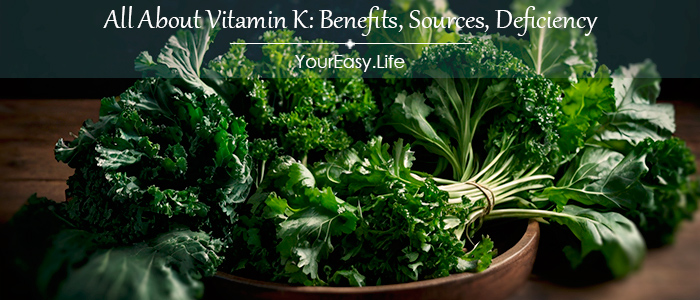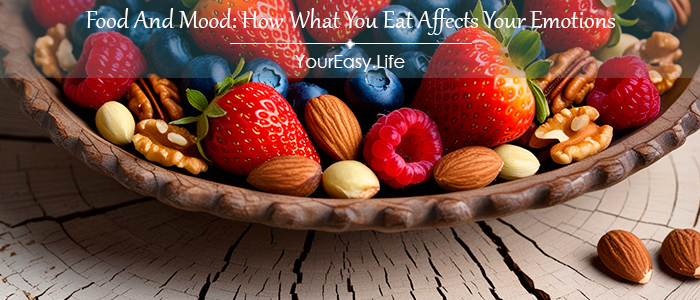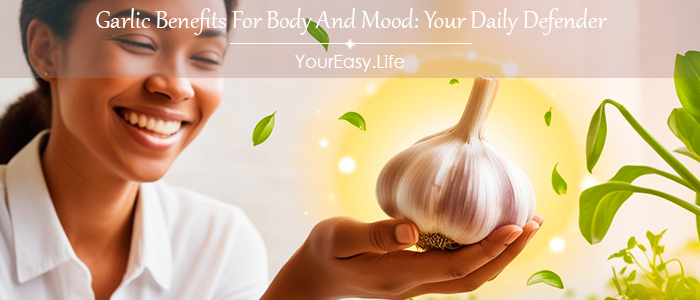In this article, we will talk about vitamin K, which might not be as well-known as vitamins A, C, or D, but is no less important for our health. Have you ever wondered why you might bruise even from a light bump or why it takes so long for wounds to heal? This could be related to a lack of vitamin K. Let’s dive in!
What Is Vitamin K?
Vitamin K is a fat-soluble vitamin (like vitamins A, D, and E) that plays a crucial role in blood clotting, maintaining bone health, skin health, and immune function.
Unlike water-soluble vitamins like vitamin C and B vitamins, vitamin K is fat-soluble, meaning it accumulates in fatty tissues and the liver. This also means that excessive intake can lead to accumulation and potential toxicity, although this is rare.
There are two main types: vitamin K1 (phylloquinone) and vitamin K2 (menaquinone). Vitamin K1 is primarily found in plant foods, in green leafy vegetables like lettuce, spinach, broccoli, kale, nettle, rye, oats, and rose hips. Vitamin K2 is produced by gut flora and found in animal products like pork liver and eggs, dairy products (cheese, yogurt), and fermented foods such as the traditional Japanese dish natto (fermented soybeans). K2 is more effectively absorbed and has additional benefits for bone and heart health.
Why Is Vitamin K Important For Our Body?
- Vitamin K helps blood clot properly. When we get bruises or small cuts, vitamin K helps stop the bleeding and speeds up healing. Without it, even small wounds could lead to significant blood loss. It also helps improve overall skin condition by reducing inflammation and promoting cell regeneration.
- Vitamin K2 plays a crucial role in bone mineralization, helping to direct the calcium we get from food or supplements to the bones and teeth rather than the arteries and soft tissues. This is particularly important for preventing osteoporosis and maintaining bone density, as calcium is directed towards building bone tissue instead of depositing in blood vessels. Interestingly, vitamin K2 is a more powerful regulator of calcium metabolism compared to K1.
- Vitamin K helps maintain the health of blood vessels and the heart by ensuring proper calcium absorption. Improper calcium absorption can lead to deposits in the vascular walls, forming atherosclerotic plaques. Numerous studies confirm that timely intake of vitamin K2 prevents this process and reduces the risk of coronary heart disease.
- Vitamin K slows down age-related negative changes in the nervous system and helps maintain full brain function.
- It also has anti-inflammatory properties. Specifically, studies show that vitamin K2 helps reduce the severity of inflammation in rheumatoid arthritis.
- Vitamin K has a positive effect on immunity, which is supported by reports of its immunomodulatory properties, and it also has antioxidant activity, protecting developing nerve cells from oxidative damage.
What Are The Advantages Of Vitamin K2 Compared To Vitamin K1?
Vitamin K2 is considered more bioavailable and effective in improving bone and vascular health compared to K1. It helps activate proteins that bind calcium in bones and prevent its accumulation in arteries, which can reduce the risk of cardiovascular disease.
Can Vitamin K Improve Heart Health?
Yes, studies show that vitamin K2 helps prevent arterial calcification, which can reduce the risk of heart disease. To direct calcium to the right places, it works together with vitamin D.
Does Vitamin K Help Heal Wounds?
Absolutely! Vitamin K promotes rapid wound healing by activating proteins involved in the blood clotting process and tissue regeneration.
Are There Other Health Benefits Of Vitamin K?
Besides bone and heart health, vitamin K also supports brain health by improving cognitive functions. It may also play a role in preventing certain types of cancer, although research in this area is still ongoing.
Vitamin K is also beneficial for facial skin health, as it strengthens capillaries and promotes the elasticity of blood vessel walls, preventing and helping treat conditions like couperose and rosacea. By normalizing blood flow, vitamin K helps even out skin tone, making it healthier and fresher.
Vitamin K helps reduce dark circles under the eyes and post-inflammatory spots, negative effects of sunburns, and, together with other lightening agents, eliminate pigmentation spots.
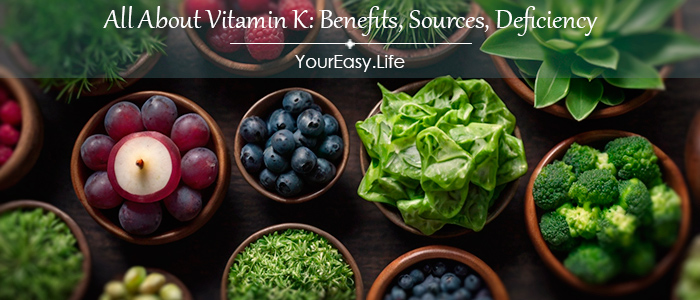
Sources Of Vitamin K
Now let’s talk about where to get this magical vitamin K to keep our health at its peak. You’ve probably already asked yourself which foods contain vitamin K and how to properly include it in your diet? Let’s find out!
In Which Foods Is Vitamin K Found?
Highest content of vitamin K (>500 mcg/100g serving): natto – fermented soybeans, leafy kale, parsley, seaweed, spinach, Swiss chard, turnips, green tea.
High content of vitamin K (100-500 mcg/100g serving): cooked lentils, mung beans, soybeans, cauliflower, chickpeas, Chinese cabbage; raw – endive or chicory, broccoli, Brussels sprouts; beef liver.
Medium content of vitamin K (25-100 mcg/100g serving): cooked asparagus, cabbage, green beans, okra, bok choy; raw – celery (3 raw stalks), green onions, green tomatoes, lettuce (1 cup), watercress, green apple (1 small); pistachios, soybean oil (15 ml), oatmeal, wheat bran, wheat flour, wheat germ, chicken liver, pork liver, coffee (1 cup).
However, the absorption of vitamin K from food is only about 20%. Even if you eat enough suitable plant foods, without adding a product with fats, you won’t get enough vitamin K because it needs fats for absorption. Even then, not all vitamin K will be absorbed. When eating plant foods without additional fat sources, the bioavailability of vitamin K1 is 5-10%, but in the presence of fat, it increases to 15-30%.
You might ask: what about the gut flora? Can’t it provide us with the necessary amount of vitamin K? Unfortunately, often it cannot. The intake of many different medications, the presence of preservatives and antibiotics in food – these are just some of the reasons causing an imbalance in the gut flora, which can reduce the synthesis of vitamin K.
How Does Cooking Affect Vitamin K Content In Foods?
Heat cooking methods (such as microwaving) increase its bioavailability, but not by much – up to about 30%. However, some cooking methods, like boiling, can reduce the vitamin K content in foods. Therefore, it’s better to steam or lightly sauté vegetables to retain more nutrients.
How Much Vitamin K Do I Need Daily?
The recommended daily dose of vitamin K varies depending on age and gender. For adult men, it is about 120 mcg, and for women, it is about 90 mcg. However, these figures can change if you have certain medical conditions or take specific medications.
Can I Get Enough Vitamin K Just From My Diet?
Absolutely! If you eat a variety of vegetables and include animal products in your diet, you can get the necessary amount of vitamin K. The key word here is variety.
Can I Get Too Much Vitamin K From Food?
The advantage of vitamin K is that its excess from food does not pose a significant threat, as our body can regulate its level, and cases of hypervitaminosis K are extremely rare. However, with supplements, you need to be cautious.
How Can I Include More Vitamin K In My Diet?
It’s easier than it seems! Here are some tips: add green leafy vegetables to salads, smoothies, and soups; eat more fermented foods like dairy products and natto; try to use vegetables as side dishes for main courses.
How Does Vitamin K Interact With Other Nutrients?
Vitamin K is especially important in tandem with vitamin D and calcium for bone health, as it helps direct calcium to the bones and not to the arteries, which is crucial for preventing cardiovascular diseases.
It is worth noting that calcium is a complex element that can sometimes be difficult to absorb. Even if you take twice the daily recommended amount of this mineral, there is no guarantee that you will completely eliminate its deficiency. Calcium that enters the bloodstream from the intestines can deposit in the vessels or internal organs instead of bone tissue. To ensure that it reaches the bones, it needs a pair of vitamins – K and D. Vitamin D3 ensures calcium absorption in the intestines, while vitamin K2 directs it directly to the bone tissue.”
It is also worth noting that fat-soluble vitamins (A, D, E, and K) are better absorbed when taken with fats, so don’t forget to add a bit of olive oil to your dishes.
What Vitamin K Supplements Are Available?
There are many supplements containing vitamin K1 and K2. Some popular forms of K2 include menaquinone-4 (MK-4) and menaquinone-7 (MK-7). However, it is always important to choose quality supplements from reputable manufacturers.
How Should I Take Vitamin K Supplements?
If you decide to add vitamin K to your diet in the form of supplements, it is best to take them with meals containing fats to improve absorption. It is also important to monitor the dosage and not exceed the recommended daily allowance without consulting a doctor.
Are There Any Side Effects Аrom Taking Vitamin K Supplements?
Generally, vitamin K is safe, but in rare cases, allergic reactions or gastrointestinal problems may occur. If you have any chronic diseases or take anticoagulants, be sure to consult your doctor before starting.
Is It Safe To Take Vitamin K With Other Vitamins And Supplements?
Yes, in most cases, vitamin K is safe when taken with other vitamins and supplements. However, if you are taking anticoagulants, it is crucial to monitor your vitamin K levels as it can affect the effectiveness of these medications. Always consult your doctor in such cases.
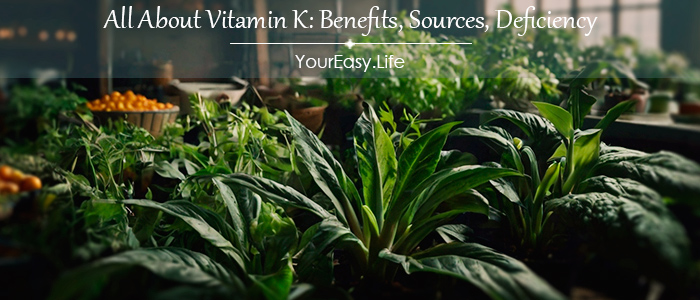
Vitamin K Deficiency
Now let’s talk about an important and often underestimated topic – vitamin K deficiency. Let’s try to understand how this condition can affect our health, who is at risk, and how to deal with it.
What Are The Symptoms Of Vitamin K Deficiency?
Here are a few symptoms to watch out for:
- Easy bruising that doesn’t heal quickly, or prolonged bleeding even from small cuts.
- Bleeding gums or nose.
- Blood in urine or stool.
- Weak bones and frequent fractures.
What Causes Vitamin K Deficiency?
There are several reasons:
- Poor diet: lack of green leafy vegetables and animal products.
- Diseases affecting fat absorption: for example, celiac disease or Crohn’s disease.
- Long-term use of antibiotics: they can kill beneficial gut bacteria that help synthesize vitamin K2.
- Use of anticoagulants that can interfere with vitamin K metabolism.
How Is Vitamin K Deficiency Diagnosed?
The diagnosis is made based on a blood test that checks the level of prothrombin, a protein necessary for clotting. If the level is low, it may indicate a vitamin K deficiency. The doctor may also recommend additional tests to determine the cause of the deficiency.
Who Is At Risk For Vitamin K Deficiency?
Certain groups of people are at risk:
- People with gastrointestinal diseases.
- Elderly people, especially those who eat few green vegetables.
- People taking anticoagulants or antibiotics for a long time.
- Newborns, as their bodies do not yet produce enough vitamin K.
Are There Conditions That Hinder Vitamin K Absorption?
Yes, some diseases like celiac disease, inflammatory bowel disease, and other digestive problems can hinder vitamin K absorption. Also, long-term use of antibiotics can reduce the level of this vitamin.
Do Elderly People Need Vitamin K?
Absolutely! Vitamin K is vital for elderly people as it helps maintain bone health and prevents osteoporosis, which can lead to fractures. Additionally, vitamin K2 plays a key role in maintaining cardiovascular health, as heart disease is common in older adults.
How Can I Prevent Vitamin K Deficiency?
Prevention is the best treatment! Here are a few tips:
- Include more green leafy vegetables in your diet, such as spinach, broccoli, and cabbage.
- Consume fermented foods like natto and dairy products.
- If you have problems with fat absorption, discuss with your doctor the possibility of taking vitamin K supplements.
- Monitor your vitamin K levels if you take anticoagulants or antibiotics.
What Are The Long-term Consequences Of Vitamin K Deficiency?
If left untreated, it can lead to serious problems:
- Osteoporosis and an increased risk of fractures due to weak bones.
- Increased bleeding and risk of hemorrhage.
- Increased risk of cardiovascular diseases due to arterial calcification.
We are glad you stayed with us until the end of this article! We hope you now know more about the importance of vitamin K and its role in maintaining your health. If you have any questions or doubts about your vitamin K level, be sure to talk to your doctor.
Remember that taking care of yourself is a journey that starts with small steps. Include more green vegetables in your diet, watch for symptoms, and don’t hesitate to consult doctors for advice. Your health is paramount. Be healthy and happy, and we at YourEasy.Life are always here to help you on this path!


